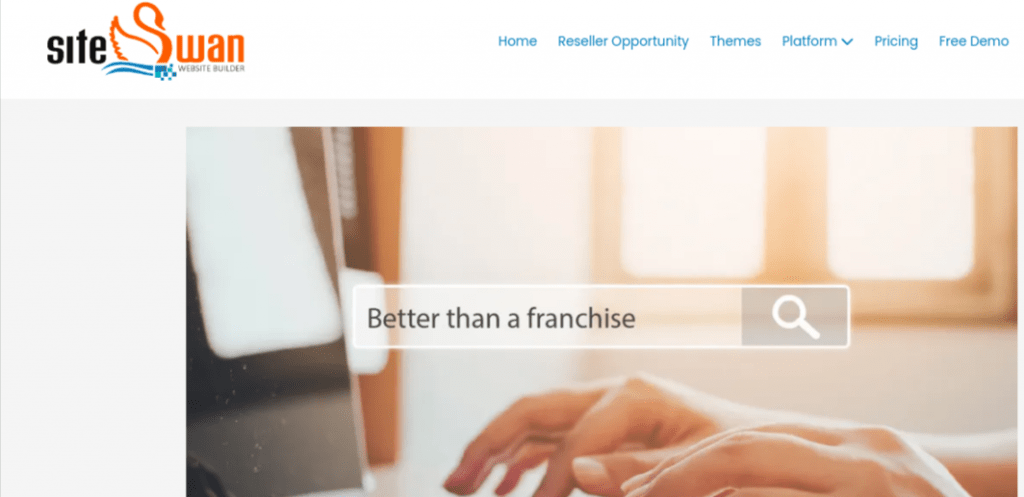Have you ever dreamt of sailing on the booming tides of the digital revolution? You should consider a web design franchise as your vessel. Basically, we live in an age where every business craves an appealing online presence. So, web design franchising presents a lucrative opportunity laden with promise.
This article will guide you through the process. We’ll explain explicitly the benefits and the potential of this burgeoning sector. So, let’s explore this world to discover how you can be a part of this digital renaissance.
Table of Contents
Web Design Franchise: A Brief Overview
Web design franchising—let’s break it down. Before everything, a franchise is a license. It enables you to access a business’s proprietary knowledge, processes, and trademarks. Therefore, you get to operate under the brand’s established name. Basically, you follow their tried and tested business model.
Now, imagine coupling that with the burgeoning field of web design. So that’s a web design franchise! You get the chance to offer custom website development services globally. And you can even do that right from the comfort of your home. You can run a digital design studio using an established brand. Also, it offers a ready-made business blueprint.
There is a rising need for a strong online presence. So, the demand for web design services is skyrocketing. That evidently makes web design franchises a lucrative and exciting prospect. Stay tuned as we dive deeper into this innovative business model.
Top Examples of Successful Web Design Franchises
If you are seeking a web design franchise, you have plenty of choices. I.e. here are some of our favorites:
Tip 1: Full Pivot

Full Pivot is a leading web design franchise providing cutting-edge digital solutions to businesses worldwide. This franchise empowers its partners to deliver high-demand services, enabling businesses to thrive in the digital era.
Benefits of partnering with Full Pivot include:
- Mobile Apps: You can help businesses increase sales with state-of-the-art mobile apps. And there is no tech experience required.
- Fast Websites: You can design multi-screen websites with e-commerce capabilities. The best part? It offers a quick turnaround and healthy profits.
- SEO: With their tech solution, you’ll help businesses rank higher on Google. Plus, it’s a repeat income opportunity.
- Mobile Commerce: You can aid local restaurants with powerful food ordering systems.
- Business Communication: Use a clear 6-step plan to improve businesses’ marketing messages.
To learn more about the exciting opportunities with Full Pivot, schedule a one-to-one consultation. It will significantly help you discover more about how this web design franchise can revolutionize your journey into the digital services business.
Tip 2: SiteSwan

Meet SiteSwan, a refreshing take on the web design franchise concept. Their White-Label Website Builder Reseller Program offers an exciting way to start a business, rather minus the usual franchise downsides.
Here’s the deal:
- No coding needed: SiteSwan’s platform makes creating professional-looking websites easy and fun, even if you’re not a tech guru.
- Low start-up costs: With SiteSwan, there’s no hefty franchise fee or ongoing royalties. You just pay a small licensing fee for the software.
- Flexibility: You operate under your brand and set your pricing. It’s your business, your way.
SiteSwan is a golden opportunity for anyone looking for a low-risk business with passive income potential. Also, existing digital marketing agencies can expand their services easily.
Their reseller program offers training, resources, templates, and themes to get you up and running fast. Plus, their websites are cost-effective, making them attractive to small businesses.
To get started, check out SiteSwan’s Free Demo. Overall, it’s a smart, simple, and affordable franchise option.
Tip 3: It’Seeze Websites

If you want to explore a franchise opportunity in a modern, prosperous industry like web design, consider the It’seeze websites franchise. I.e. here are some key points:
- No requirement for a web design background: The It’seeze model provides professional web designers and developers to create websites for your customers.
- Demand for the product: Many businesses today require responsive websites that work well on mobile devices. It’seeze franchisees provide this service.
- Training and support: As an It’seeze franchisee, you receive training and ongoing support from a team of industry professionals.
- Diverse income opportunities: Besides web design, It’seeze franchisees can offer a range of online marketing solutions, which could increase revenue potential.
- Potential for flexible work/life balance: This franchise can be run from home and doesn’t require physical stock or premises.
- Potential job satisfaction: The It’seeze model allows franchisees to potentially impact local businesses positively.
It’seeze presents a comprehensive franchise model in the web design industry, offering a balance of professional support and business autonomy. You can find out more about their franchise offer here.
Tip 4: How to Start Your Remote Web Design Franchise
Starting a remote web design franchise is relatively straightforward. It involves a few key steps:
- Research: Begin by exploring various web design franchises. Each will offer its own distinct model and benefits. Look for one that aligns with your professional goals and budget.
- Choose Your Franchise: After careful research, select the franchise that fits best with your needs.
- Contract and Start-Up Fee: You’ll usually need to sign a contract and pay a start-up fee to get your franchise off the ground.
- Training: The franchisor will offer extensive training to familiarize you with their web design platform, business model, and marketing strategies.
- Start Your Business: After you’ve completed training, you can start marketing your services and building websites for clients, all from the comfort of your home.
These steps will help you to launch a successful remote web design franchise. Remember, dedication and persistence are essential in navigating this rewarding and dynamic industry. We recommend constant training and staff development.

Seize the Digital Frontier: Your Web Design Franchise Awaits
As the digital world expands, web design franchises offer an excellent opportunity for entrepreneurs. These examples highlight the diversity and potential within the industry. Now it’s your turn to harness this potential. Start today, and carve out your own digital success story.
You’ll need hosting for your new website. And you’re in the right place – view our competitive hosting packages here and choose the one that’s best for you.
FAQ
What exactly is a web design franchise?
A web design franchise is a business model in which an established company licenses its brand, systems, and methodologies to entrepreneurs or individuals who want to start their own web design business. By purchasing a web design franchise, individuals gain the advantage of operating under a recognized brand with established processes and support from the franchisor.
When someone becomes a web design franchisee, they typically receive training and guidance on how to set up and run their business. This may include aspects such as business operations, sales and marketing strategies, client management, and web design best practices. Franchisees benefit from the experience and expertise of the franchisor, who has already navigated the challenges of running a successful web design business.
One of the main advantages of a web design franchise is the brand recognition it offers. Starting a business with an established brand can significantly reduce the time and effort required to build trust and credibility in the market. Customers are more likely to choose a web design service associated with a well-known franchise brand.
Support from the franchisor
Franchisees also benefit from ongoing support from the franchisor. This can include assistance with technical issues, updates to design tools and software, access to a network of fellow franchisees for collaboration, and guidance on industry trends and emerging technologies. The franchisor’s support can help franchisees stay competitive in the ever-evolving web design industry.
Additionally, web design franchises often provide marketing and advertising support at the national or regional level. This can help attract clients and generate leads, as the franchisor’s marketing campaigns often have a wider reach and greater impact than an individual’s marketing efforts.
Being part of a web design franchise also allows franchisees to leverage the franchisor’s established systems and processes. This can include standardized workflows, templates, and project management tools that help streamline operations and improve efficiency. By following the proven systems provided by the franchisor, franchisees can focus on delivering high-quality web design services to their clients.
However, it’s important to carefully evaluate any web design franchise opportunity before making a commitment. Factors to consider include the reputation and track record of the franchisor, the initial investment required, ongoing fees and royalties, territory restrictions, and the level of autonomy and flexibility allowed within the franchise model. Conducting thorough research, speaking with current franchisees, and seeking professional advice can help individuals make an informed decision about whether a web design franchise is the right path for them.

What skills are necessary to start such a business?
To start a web design franchise, several skills are beneficial for success in this field. Here are some key skills you may need:
Web Design and Development Skills: especially, a strong foundation in web design and development is essential. I.e. this includes proficiency in HTML, CSS, JavaScript, and other relevant programming languages. Understanding design principles, user experience (UX), and responsive design is crucial for creating visually appealing and functional websites.
Graphic Design and Creativity: having a good eye for design and being skilled in graphic design tools such as Adobe Photoshop or Illustrator can enhance your ability to create visually appealing websites. Creativity and the ability to think outside the box are valuable traits in web design.
Technical Proficiency: a sound understanding of web technologies, server-side scripting, content management systems (CMS), and web hosting is important. I.e. familiarity with tools like WordPress, Drupal, or Joomla can be beneficial for managing website content and customization.
Project management experience is also necessary
Communication and Client Management: Strong communication skills are crucial for effectively understanding and translating client requirements into a functional website. Following, being able to communicate complex technical concepts in a clear and understandable manner is essential. Additionally, good client management skills, including listening, negotiating, and problem-solving, can contribute to building long-term relationships.
Project Management: Efficient project management skills will help you handle multiple web design projects simultaneously. This includes setting project timelines, managing resources, coordinating with clients and team members, and ensuring timely delivery of projects.
Business and Marketing Skills: Running a web design franchise involves managing the business side of things. Skills such as marketing, sales, financial management, and customer relationship management are important for acquiring clients, promoting your services, managing finances, and growing your business.
Continuous Learning: The web design industry is dynamic, with new technologies and trends emerging regularly. A willingness to continuously learn, adapt, and stay updated with the latest tools and practices is crucial to providing innovative and competitive web design solutions.
While having these skills is beneficial, it’s important to note that you don’t need to be an expert in every aspect. You can also leverage the training and support provided by the franchisor to further develop your skills and knowledge in web design. As a franchisee, you can focus on leveraging your strengths while accessing the resources and expertise of the franchise system to enhance your web design capabilities.

A web development franchise is also an idea
The main differences between a web design franchise and a web development franchise lie in the specific areas of expertise and knowledge required. While there can be some overlap between the two, here are the key distinctions:
Web Design Franchise:
Design Focus: A web design franchise primarily emphasizes the visual and aesthetic aspects of website creation. It requires proficiency in graphic design, typography, color theory, and user interface (UI) design principles. Knowledge of design software like Adobe Photoshop or Illustrator is often essential. Attention to detail, creativity, and the ability to create visually appealing and user-friendly websites are crucial skills.
Front-End Development: While web design franchises may involve some front-end development, the emphasis is typically on HTML, CSS, and JavaScript for implementing design elements and ensuring a responsive layout. Understanding how design concepts translate into code and being able to work collaboratively with web developers is important.
Web Development Franchise:
Technical Focus: A web development franchise primarily focuses on the technical aspects of building and maintaining websites. Furthermore, proficiency in programming languages such as HTML, CSS, JavaScript, PHP, and frameworks like React or Laravel is essential. Also, knowledge of database management systems, server-side scripting, and web server configuration may also be required.
Back-End Development: Web development franchises often involve more extensive back-end development work. This basically includes database integration, server-side scripting, content management system customization, e-commerce functionality, and other advanced web development tasks. I.e. knowledge of server-side languages like PHP, Python, or Ruby, as well as familiarity with databases like MySQL or MongoDB, is important.
While both web design and web development franchises require technical skills, a web design franchise places more emphasis on the visual and user experience aspects of website creation. On the other hand, a web development franchise focuses on the broader scope of website functionality, integration, and advanced coding.
Finally, it’s worth noting that some franchises may offer a combination of web design and web development services, allowing franchisees to provide comprehensive solutions. The specific requirements and knowledge needed may vary depending on the franchise model and the services offered.
Email marketing skills are also important for a Web Design Franchise
While it’s not essential for web designers to be experts in email marketing, having a basic understanding of the principles and practices can greatly benefit their work. Email marketing is a powerful tool for businesses to engage with their audience, promote their products or services, and drive conversions. As a web designer, being knowledgeable about email marketing allows you to create designs that are optimized for the email medium and aligned with the overall marketing strategy.
Firstly, understanding the constraints and best practices of email design is crucial. Emails have different rendering capabilities across various email clients and devices, so designers need to be aware of responsive design techniques, email-safe fonts, and image optimization to ensure consistent and visually appealing designs across different platforms.
Secondly, having a grasp of user experience considerations in email marketing helps designers create designs that enhance engagement and conversions. Design elements such as clear call-to-action buttons, well-structured layouts, and optimized content hierarchy can improve the user experience and encourage recipients to take desired actions.
Lots of email marketing jobs available
Furthermore, collaboration with marketing teams is common in web design projects. In sum, there are many remote email marketing jobs available. Knowledge of email marketing allows designers to better understand marketing objectives, target audience segments, and messaging strategies. This alignment ensures that the email designs are consistent with the overall brand identity and marketing goals, resulting in a cohesive user experience across multiple touchpoints.
Lastly, having familiarity with email marketing integration points on websites enables designers to create seamless user experiences. Whether it’s designing email signup forms, opt-in pop-ups, or transactional email templates, understanding the purpose and functionality of these elements allows designers to integrate them seamlessly into the overall website design and maintain a consistent user journey.
Overall, while not a prerequisite, having a basic understanding of email marketing empowers web designers to create designs that are visually appealing, responsive, aligned with marketing strategies, and optimized for user experience. It enhances collaboration with marketing teams and enables designers to deliver designs that effectively support the organization’s email marketing efforts.
What technologies you must know to start a business?
To start a web design company, it’s important to have a strong foundation in various web technologies. I.e. here are some key technologies you should consider learning:
HTML (Hypertext Markup Language): evidently, HTML evidently the backbone of web design, since it defines the structure and content of web pages. Understanding HTML tags, elements, and their semantic usage is essential for creating well-structured and accessible websites.
CSS (Cascading Style Sheets): CSS is used to style and visually enhance web pages. It allows you to control the layout, typography, colors, and overall presentation of a website. Proficiency in CSS is crucial for creating visually appealing designs and achieving consistent styling across different devices.
JavaScript: JavaScript is a scripting language that adds interactivity and dynamic functionality to web pages. It allows you to create interactive elements, handle form validations, manipulate the DOM (Document Object Model), and perform client-side scripting. Familiarity with JavaScript frameworks and libraries like jQuery, React, or Vue.js can be beneficial for more advanced interactions.
Responsive Web Design: With the increasing use of mobile devices, it’s important to learn responsive web design techniques. This involves designing and developing websites that adapt and display properly across various screen sizes and devices. Generally, CSS frameworks like Bootstrap or Foundation can assist in building responsive layouts.
Some more tools necessary
Design Tools: Familiarity with design tools like Adobe Photoshop, Illustrator, or Sketch can be valuable for creating mockups, wireframes, and visual assets. Moreover, these tools enable you to design custom graphics, brandmark logos, and other visual elements for your websites.
Content Management Systems (CMS): Many clients prefer using content management systems to manage their website content easily. I.e. understanding popular CMS platforms like WordPress, Drupal, or Joomla can give you an advantage in providing CMS-based web design solutions.
Version Control Systems: at the present time, Git is a widely used version control system that helps track changes in your codebase and facilitates collaboration with other developers. Learning version control is beneficial for managing project versions and ensuring code integrity.
SEO (Search Engine Optimization): Having a basic understanding of SEO principles can help you create websites that are optimized for search engines. Knowledge of SEO best practices, including on-page optimization, metadata, keyword research, and site performance, can enhance your web design services.
Remember, the web design industry is continually evolving, so it’s crucial to stay updated with new technologies and trends. As you gain experience, consider exploring additional technologies like server-side scripting languages (e.g., PHP, Python, or Node.js), databases, frameworks, and APIs, depending on your specific business needs and client requirements.